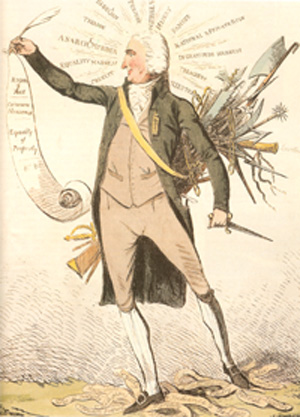| november 12, 2006 (0050us)
tom paine and I |
 At
New York in 1998 somebody told me, "Brother Michel, the creative energy
one draws from you and The Revelation of Ares is reminiscent of the
social energy that Americans drew from Tom Paine and his manifesto
"Commen Sense" in 1776. At
New York in 1998 somebody told me, "Brother Michel, the creative energy
one draws from you and The Revelation of Ares is reminiscent of the
social energy that Americans drew from Tom Paine and his manifesto
"Commen Sense" in 1776.The likening came as a surprise. I had had a vague knowledge of the character, Thomas Paine (his detractors called him Tom), one of the founding fathers of the American independence... I couldn't see any similarity between him and me. Whats' more, I thought he was an atheist. I knew that he had been a rough, coarse, unkempt, man unlike me. Admittedly I knew that General Washington had ordered Tom Paine's words read to his exhausted, frostbitten troops so as to inspirit them before he launched a surprise attack on Trenton, but I also knew that Tom Paine would get on the wrong side of most of the great Americans of his time, probably, I imagined, because he might not be as praiseworthy as he had once seemed. I was unconscious that the 2d president of the USA, John Adams, when he had called Tom Paine's great manifesto "Common Sense" "a poor, ignorant, malicious, short-sighted, crapulous Mass," had used unflattering terms meaning much the same as the terms spoken by bourgeois opponents of The Revelation of Ares, and that the Federalists called TomPain "a loathsome reptile" , the same, but for the words, as some conformist clergy and politicians describe me. And the next thing was several books on Tom Paine were published during 2006, I don't know what they came out to commemorate. Now I can read the very words by Tom Paine that Washington ordered his army nearly paralyzed in the blizzard to listen to, "These are the times that try men's souls. The summer soldier and the sunshine patriot will, in this crisis, shrink from the service of their country; but he that stands it now deserves the love and thanks of man and woman. Tyranny like hell is not easily conquered; yet we have this consolation with us, that the harder ths conflict, the more glorious the triumph." The next morning the Continentals crossed the Delaware River and fought to a stunning, pivotal victory, after which the English army would be forever retreating until they re-embarked. How could I not realize then, all of a sudden, that the man in New York, in 1998, had drawn a parallel between the 1776 American patriots and our missionaries, There will be a time for their toil and eternity for their glory (Rev of Ares 37/9)? I have lately read that Tom Paine, whom I thought was an atheist, in reality was a non-religious believer, a scathing critic of the churches and clergy, just as The Revelation of Ares is. I was aware that he had dreamt of society with no government, but now I find out that he was vehemently critical of political power and law, just as The Revelation of Ares is critical. This is why he would be hated by the very men that had used his eloquence and ideas to become leaders. As for Tom Paine, he vould keep on refusing to hold a leadership, whatever, and would be contempted for that just as I am contempted by the system's men, who see my own refusal to be a leader (Rev of Ares 16/1) and give the Ares Pilgrims assembly a social structure and a hierarchy as a detestable, dangerous model. In conclusion, how deserving Tom Paine was! He did not have to be bending like me under the Father's knee (Rev of Ares 12/9) to be taught the Truth. He found it all by himself through his own intelligence. I most sincerely wonder why the Father came down and spoke to me, who had not a quarter of Tom's capability. |
| Add a comment |
|
00Xxx00 XXCX Text Signature |